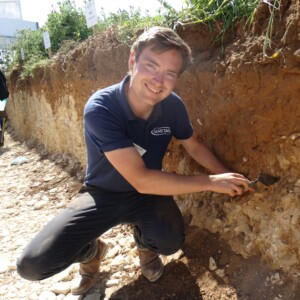
David Clarke
Cranfield University
Project
Site-season effects on crop productivity to support sustainable intensification
Supervisors
- Professor Stephen Hallett
- Dr Jacqueline Hannam (Cranfield University)
- Dr Elizabeth Stockdale (NIAB)
- Dr Benjamin Marchant (BGS)
PhD Summary
The PhD project will develop a structured approach to disentangle the drivers of crop productivity across the crop rotation with a particular focus on spatial/temporal interactions at farm-scale. The high data density available for Morley Farms, Morley St Botolph, and Norfolk will be used to disentangle the spatial/temporal interactions driving crop productivity across the crop rotation. Approaches will be developed to collate and integrate data from different years and of different types (e.g. weather, satellite imagery, in-field observations) to assess spatio-temporal yield stability within and across the rotation and interactions with weather patterns. Long-term NIAB agronomic field trials and monitoring at Morley will be used to evaluate biophysical crop/soil simulation models and then application of integrated modelling approaches with site-specific calibration to support in-season and between-season rotational management decisions.
Previous activity
After finishing a masters by research project investigating the impacts of climate variability on UK wheat yields I took up the role as Soils and Farming Systems Research Technician at NIAB TAG. NIAB’s experiments are farmer-focused, with practical implications for UK agriculture. However occasionally it has been frustrating that I couldn’t explore all of my ideas further or include in to my work the added complexity of data gathering and analysis that would be required. Completing a PhD will allow me to do this with greater impact and with a more focused direction. My PhD will continue to use the experiments I have been working on to help explore what are the site-season effects on crop productivity to support sustainable intensification.
Why did you choose doctoral research?
I believe that by understanding on hyperlocal scale (less than field scale) how soil physical, chemical and biological properties interact with season (weather) and climate, inputs (i.e. inorganic and organic fertilizer and pesticides) and management (i.e. rotation and cultivation), productivity can be improved through site specific management decisions. Areas of concern for risk of erosion, leaching, runoff and compaction can be identified and managed appropriately. The objectives of this project closely match my previous research interests and technical skills and provide the opportunity to integrate these areas of agricultural research and provide a useful decision-making tool for farmers.
Why did you choose CENTA?
Completing a CENTA PhD will allow me to do this with greater impact and with a more focused direction. I am also keen to build on my skills in scientific research dissemination through publications of peer reviewed articles and at conferences. I would also like to develop better methods of knowledge exchange with end users (i.e. farmers and agronomists) to improve practical implementation of research findings and recommendations. Currently the broad range of agricultural field trials I report on requires me to have a good knowledge of large aspects of agricultural and soil science. In my PhD I hope to focus this knowledge and develop an expertise in precision soil and agronomic monitoring, modelling and management that I can then continue to develop throughout my research career. The high quality and detailed training and support offered by a CENTA PhD will allow me to do this.
Future plans
I hope to continue my applied research at NIAB after my PhD.
